2015 Belize Tarpon Tagging Expedition
Tarpon in Chicago?
Sometimes for inspiration I go to the Shedd Aquarium in downtown Chicago where, in fact even on a single digit January day, there are tarpon. What? Yes, there are tarpon in Chicago. Two to be exact. In 1935 a train full of tropical fish from the Florida Keys were brought up to Chicago, including tarpon.

As a second-grader, on a yellow school bus field trip, I first saw Megalops atlanticus. This was not a unique experience, mind you, it was one I shared with probably 1-million visitors the aquarium welcomed that year. Little did I know in 1975 these huge acrobatic silver fish would earn such a special place in my heart.
Modern science has taught us many adult tarpon migrate thousands of miles annually. So, that historic 1500-mile trip from Key West to Chicago is not so unique from a distance perspective for a tarpon. But boy is Chicago a unique place for a tarpon to live. Wait, stop the presses... in the last 20 years, we've learned tarpon live in many unique environments. Tarpon spawn in deep ocean currents. Juveniles grow in murky mangrove estuaries and shallow tidal zones. Once tarpon reach adulthood they feed on schools of mullet, shrimp and crabs in bays, freshwater rivers and in the open ocean.
Simple science taught us they are a very long-lived fish. Want proof? Back to Chicago - here is the
80-year-old tarpon being fed, January 15, 2015.
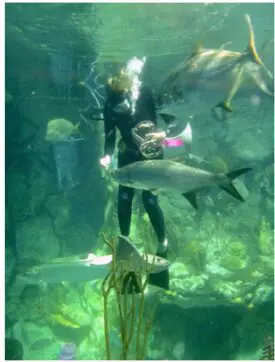
The chart below highlights in red the great distance's tarpon migrate in our part of the world. This data was collected by scientists at the University of Miami using satellite tags. Maybe the most significant thing we can take from this information is tarpon travel tremendous distances, and they need safe passage to succeed. Along these migration routes there are places critical to the success of the species. Places like the Marquesa island chain west of Key West, Boca Grande in Florida's Gulf and Long Caye in northern Belize. They have all been discovered to be aggregation spots. Annually tarpon are seen in masses in these aggregation spots as they feed, daisy chain, cruise the flats and roll in the rising morning sun.
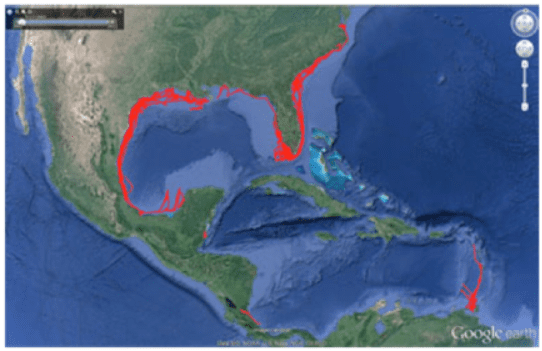
Tarpon Range
People began fishing for tarpon with rod and reel in earnest in Florida in the 1930s. Over the years, tarpon have become a hugely popular sport fish. Research has shown that now hundreds of millions of dollars are spent annually in the pursuit of these magnificent fish. But things have changed, once famous tarpon aggregation spots like Port Aransas, Texas and Homosassa, Florida do not see the returns of migratory tarpon they once did. The same can be said of Boca Grande and the Florida Keys. The days of simply going fishing and not doing what you can on an individual basis to steward this resource are over. Odds are, if we don't get involved in making things better, future generations of people just like us won't be able to enjoy tarpon as we have. The time for action is now.
While catch and release became wonderfully successful in the sport fishing world, if we want things to get better, the evolution of individuals exerting effort to nurture the marine environment must grow. One alternative today is to financially support the many wonderful resource stewardship organizations out there. This solution is not enough for some people. There is a special group of people out there who would like to get more involved, dig in and get their hands dirty. People who actually want to participate in enabling science. The type of science that intends to make the discoveries that will hopefully pave the way to a sparkling future for the Silver King.
Are you one of these people?
Back to Chicago, where a tarpon that was brought here in 1935 still lives and continues to introduce millions of people to the species in 2015. Here I sit alongside the Caribbean Reef exhibit, trying to figure out how to actually get help from a few special people this coming summer in Belize.
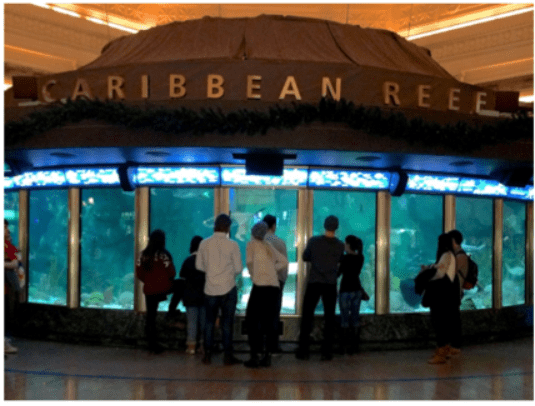
I'll cut to the chase, this coming August at El Pescador in Belize there are a few spots still open for the Belize Tarpon Tagging Expedition. This is not just a fishing trip, it's an expedition. Year 3 of a multi-year partnership between tarpon anglers and the scientists of the University of Miami, Rosenstiel School of Marine and Atmospheric Science. There are 3 parts to the expedition, world-class tarpon fishing, advancing science and learning. The scientific goal is to place very sophisticated satellite tags on large adult tarpon that migrate through Belize waters each summer. Doing this should put us one step closer to learning how to ensure the success of the tarpon we hope to see in Belize for years to come. Accomplishing the goal will not be easy, it requires an active partnership between world-class anglers and world-class scientists.
We have the science, now we need more anglers.
This expedition will be led by myself and famed tarpon angler (and the man who wrote the book on tarpon fishing with a fly rod), Andy Mill. Andy's son Nicky Mill will also be joining us, and together we intend to lead this small group of passionate tarpon anglers on an experience of a lifetime.
2015 Tarpon Tagging Expedition Leaders
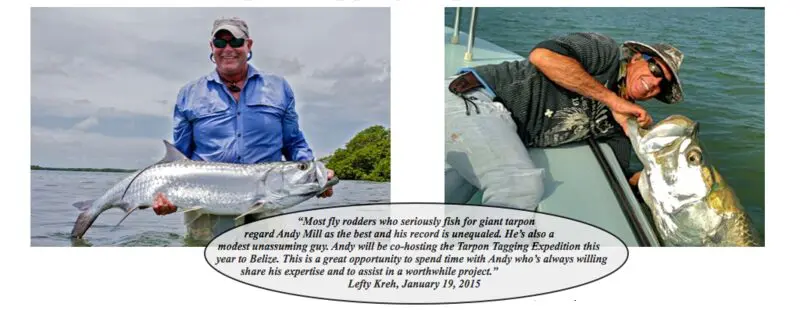
Adam Marton
Andy Mill
This expedition effort is now in its 3rd year. In 2014 our team was joined by Stu Apte and Dr. Jerry Ault.

On August 13th 2014, after at truly epic battle, young fly angler, Michael of Boulder, Colorado caught, and together we successfully tagged and released a 100-pound plus tarpon.
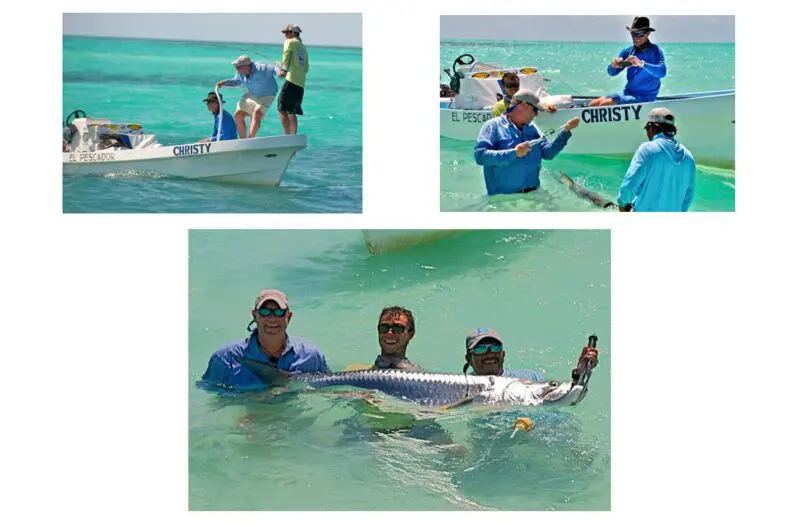
THE FISHING WAS GREAT

WE MADE MEMORIES TO LAST A LIFETIME

LEARNED A TON

& NOW IT'S TIME TO GET BACK TO WORK
I have a vision, and it's not in Chicago at the Shedd Aquarium, it's somewhere out on the flats. 100 years from now, I'd like to see hundreds of wide-eyed kids standing shoulder to shoulder in the rising sun to get a glimpse of huge schools of silver kings.
The success of the 2015 expedition depends on several engaged anglers who want to do everything they can to advance tarpon research while fishing, learning and having a ton of fun in Belize. It's not an easy task to hook and land a 100-pound, plus tarpon, and we could sure use some good help. If you'd like to join the 2015 Belize Tarpon Tagging Expedition now is your chance.
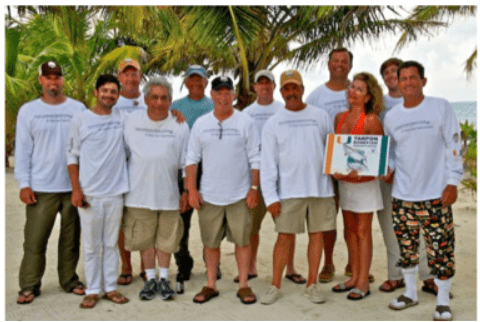
2013 Expedition Team

2014 Expedition Team
AN OPPORTUNITY TO LEARN

Andy and Adam have two things in common. They both became completely obsessed tarpon anglers about 25 years ago and to this day are as excited by tarpon as they ever were. Nicky happens to have had the good fortune of learning a thing or two from his Dad.
Andy Mill's success is profound, awarded Olympic downhill ski racer, network TV broadcaster and tournament fly angler. Winning more invitational fly tournaments than anyone. Author of the award-winning book "A Passion for Tarpon" he has become one of our sport's leading authorities.
The three of us are as excited as we can be to share the tarpon lessons we have learned in daily expedition workshops that will flat out make you a better fisherman. When, where and how to cast, feeding the beast, setting the hook, applying maximum pressure, fighting to win, fly tying, fly selection, tidal flows, Moon phases, knots, leaders, tools, gear selection, literature and the science of tarpon research. We will be covering these topics and more throughout the week. Plan on having many opportunities to apply and
practice what you're learning through this truly unique experiential eduction program.

The Belize Tarpon Tagging Expedition will take place August 15-22, 2015 at El Pescador Lodge and Villas. There will be 6 guided fishing days and daily tarpon fishing workshops. Participants should expect to come home from this expedition with the knowledge they were part of a team doing everything it can to advance tarpon research in Belize. Plan on learning about tarpon and tarpon fishing from 3 of the finest and most passionate tarpon anglers in the world. We can't wait to share what we know and look forward to enhancing your tarpon fishing for the rest of your life.
Expedition fees include lodging, guided fishing, meals/local drinks, exclusive expedition workshops & activities, an expedition shirt, a $100 donation to the University of Miami and all the other benefits of the lodge. El Pescador is world-famous for great reason, and in every way a wonderful lodge host for the expedition. A ton of information about El Pescador, the fishing and all the great attributes of the lodge can be found on the Internet at; www.elpescador.com
The fee for the Belize Tarpon Tagging Expedition is $4,280.00/per person based on shared skiff and lodging. Single rooms, Villas and single skiffs are available at an extra cost.
To learn more or reserve your spot, please contact;
Adam Marton
The Fieldworkers Club,
230 East Ohio Street,
Chicago, IL 60611
(312) 440-1200/office, (312) 213-2324/mobile
adam@fieldworkersclub.com
